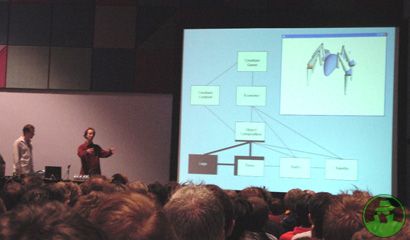Chris Hecker and Chaim Gingold are outspoken vanguards of wild, experimental approaches to game design and development. Is it any coincidence that these two designer-programmers are both working on Spore, Will Wright's experimental new Maxis title? This morning when the pair spoke about the processes they use to build up a breakthrough title like Spore, people were mobbed outside the door waiting to get in.
So just what is the voodoo that they do?
The answer is Prototyping. Let's face it, games these days are gigantic, requiring huge teams of designers and artists and programmers to struggle together in order to get something to market over the course of a few years. So how can you tell if an idea is going to work? How can you tell if something will be fun ... before you dump 20 million dollars into building it? The answer to this question doesn't just help a game developer run better: these days, it's the difference between life and death. Prototyping allows game designers to test out little functional bits and pieces of a game, to see if the gameplay, the technology, or the usability work as they're supposed to.
Good prototypes are cheap and fast. They're little computer programs, written ideally by one programmer over the course of a day or a week. (Interestingly, many of Hecker and Gingold's observations were echoed earlier in the conference by The Experimental Gameplay Project Guys.) The most important thing about building a prototype is that it has to answer a very specific question about a very specific part of the game -- in scientific terms, it has to be "falsifiable." Prototypes won't find the answers to problems; they're useful for testing solutions that people think might work.
Of course, the usefulness of prototypes goes beyond answering some sort of yes or no question. The process itself is informative. Surprising, even. Prototypes will show the upsides and downsides of different approaches. They'll also inspire or focus a team, which is important given the number of people who need to work together to make a game nowadays. Prototypes are a far more powerful tool than, say, big thick design documents.
"You can't argue with a prototype," Hecker explained. "If it's cool, people shut up."






